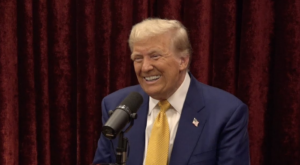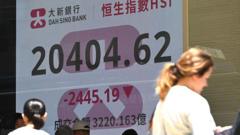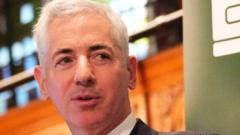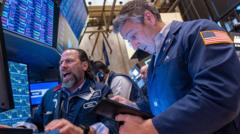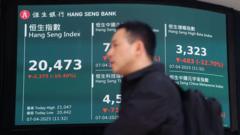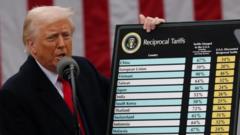As the US implements a 10% baseline tariff on all imports, President Donald Trump rallies citizens to remain resilient amidst stock market turbulence affecting multiple countries. Protests erupted across America against the President’s policies, heightening tensions in an already strained global trade environment.
Trump Calls for Resilience as 10% Tariffs Take Effect
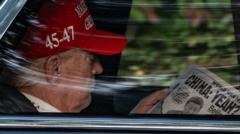
Trump Calls for Resilience as 10% Tariffs Take Effect
President Trump urges Americans to stay strong amid market turmoil as new tariffs impact global trade.
The US has officially begun collecting a 10% "baseline" tariff on all imports starting Saturday, prompting President Donald Trump to call for Americans to "hang tough" during this turbulent period marked by significant market upheavals. The fallout from these tariffs extends beyond American borders; leaders from the UK and France, among many nations impacted, have expressed that they are considering all options in response.
Market indices in the U.S. suffered steep declines, with all three major stock indexes plunging over 5% on Friday. The S&P 500 alone fell nearly 6%, marking the worst week for the U.S. stock market since 2020. As protests erupted in cities like Washington DC and New York against Trump's administration, he characterized the financial instability as an "economic revolution" that the nation will ultimately triumph over.
“Hang tough, it won't be easy, but the end result will be historic,” Trump stated in a post on Truth Social, referring to the policy changes affecting global supply chains, especially for China, which is facing the most significant backlash from the tariffs. China's response includes a notable retaliation, imposing tariffs of 34% on U.S. imports while also lodging a complaint with the World Trade Organization.
Billionaire entrepreneur Elon Musk provided a silver lining amidst the turmoil, suggesting that a shift towards a "zero-tariff situation" could benefit both the U.S. and Europe, promoting a free-trade zone across the Atlantic. His comments came as the Trump administration prepares to levy tariffs of up to 50% on certain "worst offenders" on April 9, targeting various global trade partners.
In the UK, the financial repercussions are already evident as the FTSE 100 index fell nearly 5% – marking the steepest decline in five years. British Prime Minister Sir Keir Starmer engaged in discussions with global leaders, aligning efforts with French President Emmanuel Macron to address the potential fallout from the trade wars.
While Trump's tariffs appear to provoke fierce global responses, the impact is tangible for multinational companies too. For instance, British automaker Jaguar Land Rover announced they would "pause" all shipments to the U.S. as they navigate the new trade landscape.
As protests against Trump's administration unfold—expected to be the largest single day of demonstrations against him and Musk—unanswered questions regarding the future of U.S. trade policies loom large. The White House has yet to address the protests, and Trump's focus on strengthening the executive branch raises further concerns over governance amid a tumultuous economic climate.
Market indices in the U.S. suffered steep declines, with all three major stock indexes plunging over 5% on Friday. The S&P 500 alone fell nearly 6%, marking the worst week for the U.S. stock market since 2020. As protests erupted in cities like Washington DC and New York against Trump's administration, he characterized the financial instability as an "economic revolution" that the nation will ultimately triumph over.
“Hang tough, it won't be easy, but the end result will be historic,” Trump stated in a post on Truth Social, referring to the policy changes affecting global supply chains, especially for China, which is facing the most significant backlash from the tariffs. China's response includes a notable retaliation, imposing tariffs of 34% on U.S. imports while also lodging a complaint with the World Trade Organization.
Billionaire entrepreneur Elon Musk provided a silver lining amidst the turmoil, suggesting that a shift towards a "zero-tariff situation" could benefit both the U.S. and Europe, promoting a free-trade zone across the Atlantic. His comments came as the Trump administration prepares to levy tariffs of up to 50% on certain "worst offenders" on April 9, targeting various global trade partners.
In the UK, the financial repercussions are already evident as the FTSE 100 index fell nearly 5% – marking the steepest decline in five years. British Prime Minister Sir Keir Starmer engaged in discussions with global leaders, aligning efforts with French President Emmanuel Macron to address the potential fallout from the trade wars.
While Trump's tariffs appear to provoke fierce global responses, the impact is tangible for multinational companies too. For instance, British automaker Jaguar Land Rover announced they would "pause" all shipments to the U.S. as they navigate the new trade landscape.
As protests against Trump's administration unfold—expected to be the largest single day of demonstrations against him and Musk—unanswered questions regarding the future of U.S. trade policies loom large. The White House has yet to address the protests, and Trump's focus on strengthening the executive branch raises further concerns over governance amid a tumultuous economic climate.


